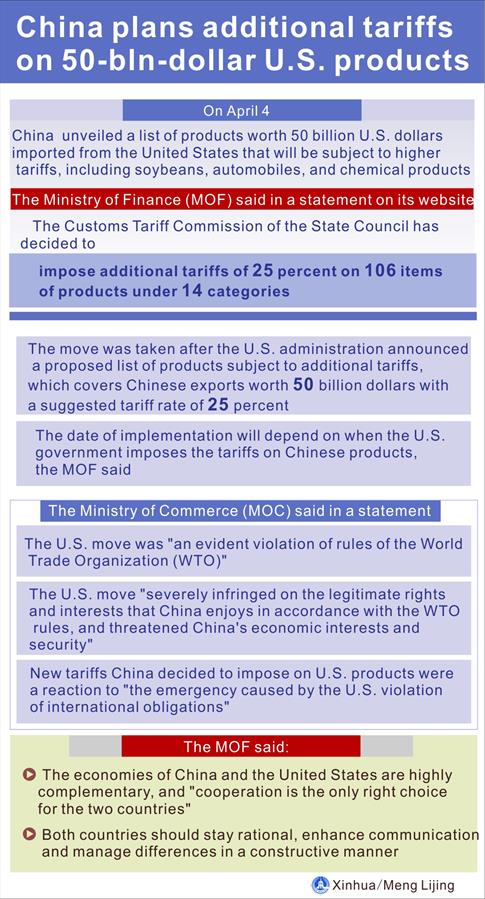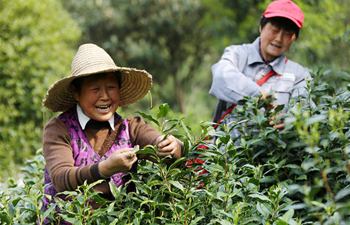
The graphics shows that China unveils a list of products worth 50 billion U.S. dollars imported from the United States that will be subject to higher tariffs, including soybeans, automobiles, and chemical products on April 4. (Xinhua/Meng Lijing)
BEIJING, April 4 (Xinhua) -- China on Wednesday unveiled a list of products worth 50 billion U.S. dollars imported from the United States that will be subject to higher tariffs, including soybeans, automobiles, aircraft and chemical products.
The decision was made by the Customs Tariff Commission of the State Council, involving a possible additional tariff of 25 percent on 106 items of products under 14 categories, the Ministry of Finance (MOF) said on its website.
The move was taken after the U.S. administration announced a proposed list of products subject to additional tariffs, which covers Chinese exports worth 50 billion dollars with a suggested tariff rate of 25 percent.
"The date of implementation will depend on when the U.S. government imposes the tariffs on Chinese products," the MOF said.
PRODUCTS INVOLVED
The U.S.-proposed list covers approximately 1,300 products imported from China from industries such as aerospace, information and communication technology, robotics and machinery, the Office of U.S. Trade Representative said in a statement.
The proposed tariff list is based on a Section 301 investigation into alleged Chinese intellectual property and technology transfer practices launched by the U.S. administration in August 2017.
In response, China's list includes a wide variety of agricultural products such as soybeans, corn, beef, orange juice and tobacco.
U.S. soybeans sold to China account for 62 percent of its total soybean exports, with 32.85 million tonnes of soybeans exported to China in 2017, or 34.39 percent of China's total imports, Vice Finance Minister Zhu Guangyao said at a press conference.
While U.S. farmers can get the benefits from healthy Sino-U.S. economic ties, the export amount to China was "too big," he said.
Chinese farmers have petitioned industry associations, claiming that U.S. subsidies hurt the interests of Chinese soybean growers, and China must respect its farmers' demands, Zhu said.
"That's why soybeans became one of our choices as a countermeasure," he added. China was forced to bring forward the product list, and there are grounds for the specific items and their order on the list, Zhu said.
A range of chemicals and automobiles, as well as certain aircraft, will also be subject to the tariffs, according to the list.
The Boeing 737 narrow body jet falls under the description and may have to face additional tariffs when entering China.
Boeing's shares plunged more than 4 percent in premarket trading Wednesday.
REACTION WITH "RESTRAINT"
"Disregarding serious representations by China, the United States announced tariff proposals that are completely unfounded, a typical unilateralist and protectionist practice that China strongly condemns and firmly opposes," the Ministry of Commerce (MOC) said on its website.
The U.S. move was "an evident violation of rules of the World Trade Organization (WTO)," the MOC said.
Its measures "severely infringed on the legitimate rights and interests that China enjoys in accordance with the WTO rules, and threatened China's economic interests and security," the MOC said.
New tariffs China decided to impose on U.S. products were a reaction to "the emergency caused by the U.S. violation of international obligations," it added.
China has filed a request for consultations under the WTO dispute settlement framework over the U.S.-proposed list, the MOC said in a separate statement.
"China is an active participant, firm supporter and an important contributor in multilateral trade mechanisms," said the statement, citing an unnamed spokesperson.
"We hope and believe that the WTO dispute settlement body will deal with the case in an objective and just manner to safeguard rule-based international trade order," the spokesperson said.
The economies of China and the United States are highly complementary, and "cooperation is the only right choice for the two countries," the MOF said.
Since the two countries established diplomatic relations in 1979, bilateral trade has surged more than 230 times to 580 billion dollars in 2017, data showed.
"I have to say that we were forced to take countermeasures, and we have reacted with restraint," Vice Minister of Commerce Wang Shouwen told reporters.
Both countries should stay rational, enhance communication and manage differences in a constructive manner, according to the MOF.
They should seek constructive measures to deal with problems and challenges so as to bring bilateral economic ties back to a healthy and stable track, Zhu said.
China does not want a trade war, as there will be no winners, according to Wang.
"But we are also not afraid of it. If someone insists on starting such a war, we will fight till the end," Wang said.















